
Virgie Belle Smith McFarland (1877 - January 24, 1971) was instrumental in establishing the first Aberdeen Women's Exchange in 1918.

Virgie Belle Smith McFarland (1877 - January 24, 1971) was instrumental in establishing the first Aberdeen Women's Exchange in 1918.
Virgie Belle Smith McFarland was born in 1877 in Keosauqua, Iowa, the daughter of William Dixon Smith (1819-1911) and Ruth E. Maple (1839-1923). [1]
She was an educator and wrote articles and stories for eastern syndicate. [1]
She was instrumental in establishing the first Aberdeen Women's Exchange in 1918. [1]
She was chairman of the Playfield Commission. [1]
She was a member of the Harbor Civic Club, Sorosis Club and Writers Club. [1]

Virgie McFarland moved to Washington in 1888 and lived in Aberdeen, Washington. She married George Mcfarland (1870-1943) and had four children, Ruth Puphal, Frank, Virgil George McFarland (1902-1973), Elizabeth "Betty". [1]
She died on January 24, 1971, and is buried at Fern Hill Cemetery, also located in Aberdeen, Washington.

Abigail Scott Duniway was an American women's rights advocate, newspaper editor and writer, whose efforts were instrumental in gaining voting rights for women.

The National Association of Colored Women's Clubs (NACWC) is an American organization that was formed in July 1896 at the First Annual Convention of the National Federation of Afro-American Women in Washington, D.C., United States, by a merger of the National Federation of African-American Women, the Woman's Era Club of Boston, and the Colored Women's League of Washington, DC, at the call of Josephine St. Pierre Ruffin. From 1896 to 1904 it was known as the National Association of Colored Women (NACW). It adopted the motto "Lifting as we climb", to demonstrate to "an ignorant and suspicious world that our aims and interests are identical with those of all good aspiring women." When incorporated in 1904, NACW became known as the National Association of Colored Women's Clubs (NACWC).

Neysa Moran McMein was an American illustrator and portrait painter who studied at The School of The Art Institute of Chicago and Art Students League of New York. She began her career as an illustrator and during World War I, she traveled across France entertaining military troops with Anita P. Wilcox and Jane Bulley and made posters to support the war effort. She was made an honorary non-commissioned officer in the United States Marine Corps for her contributions to the war effort.

Ruth Hanna McCormick, was an American politician, activist, and publisher. She served one term in the United States House of Representatives, winning an at-large seat in Illinois in 1928. She gave up the chance to run for re-election to seek a United States Senate seat from Illinois. She defeated the incumbent, Senator Charles S. Deneen, in the Republican primary, becoming the first female Senate candidate for a major party. McCormick lost the general election. A decade later, she became the first woman to manage a presidential campaign, although her candidate, Thomas E. Dewey, failed to capture his party's nomination.

Anne Gwynne was an American actress and model who was known as one of the first scream queens because of her numerous appearances in horror films. Gwynne was also one of the most popular pin-ups of World War II. She is the maternal grandmother of actor Chris Pine.

The General Federation of Women's Clubs (GFWC), founded in 1890 during the Progressive Movement, is a federation of over 3,000 women's clubs in the United States which promote civic improvements through volunteer service. Many of its activities and service projects are done independently by local clubs through their communities or GFWC's national partnerships. GFWC maintains nearly 70,000 members throughout the United States and internationally. GFWC remains one of the world's largest and oldest nonpartisan, nondenominational, women's volunteer service organizations. The GFWC headquarters is located in Washington, D.C.
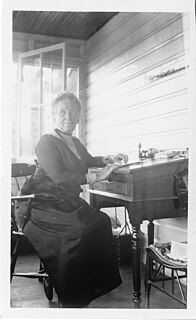
Cornelia Maria Clapp was an American zoologist and academic specializing in marine biology. She was born in Montague, Massachusetts, the first daughter and oldest child of two teachers, and was rated as one of the top zoologists in the United States in her lifetime.

Sorosis was the first professional women's club in the United States. It was established in March 1868 in New York City.

Belle Moskowitz was an important Progressive reformer political influencer in the early 20th century. In her obituary, the New York Times referred to her as the most powerful woman in United States politics. She worked as a political advisor and publicist to New York Governor and 1928 Democratic presidential candidate Al Smith.

The Battle Creek Belles were a women's professional baseball team that played from 1951 through 1952 in the All-American Girls Professional Baseball League. The Belles represented Battle Creek, Michigan, and played their home games at Bailey Park.
Mary Eloise Hughes Smith, also referred to as Eloise Smith or Mrs. Lucian P. Smith, was a survivor of the 1912 RMS Titanic disaster. Her first husband, Lucian P. Smith, scion of a wealthy Morgantown family with vast holdings in the Pennsylvania coal fields died in the sinking; she later married a fellow survivor.

Dame Louisa Innes Lumsden born in Aberdeen, Scotland, was a pioneer of female education. Lumsden was one of the first students Girton College, Cambridge in 1869 and to pass the Tripos examine in 1873. She returned as a tutor to Girton in 1873. Lumsden became the first Headmistress of St Leonards School, Fife, and first warden of University Hall, University of St Andrews. She is credited with introducing lacrosse to St Leonards.
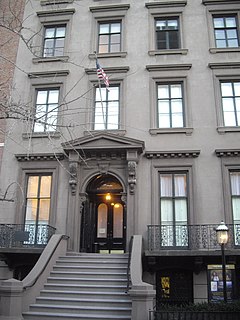
The Salmagundi Club, sometimes referred to as the Salmagundi Art Club, is a fine arts center founded in 1871 in the Greenwich Village section of Manhattan, New York City. Since 1917, it has been located at 47 Fifth Avenue. As of 2021, its membership roster totals roughly 1,100 members.
The Hroswitha Club was a membership-based club of women bibliophiles and collectors based in New York City, active from 1944 to 2004.
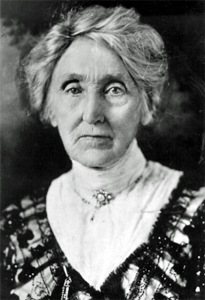
Mary Eleanor Brackenridge was one of three women on the first board of regents at Texas Woman's University, the first women in the state of Texas to sit on a governing board of any university. She was active in women's clubs and was a co-founder of the Woman's Club of San Antonio. Brackenridge was a leader in Texas suffrage organizations and helped get the 19th Amendment to the United States Constitution passed. She was the first woman in San Antonio to register to vote. Although it's the Brackenridge name in Texas that is associated with wealth, philanthropy and achievement, Brackenridge qualified as a member of the Daughters of the American Revolution through her mother's lineage. Miss Brackenridge was a founding member and the first Regent of the oldest DAR chapter in San Antonio, the San Antonio de Bexar Chapter, established on December 11, 1902.
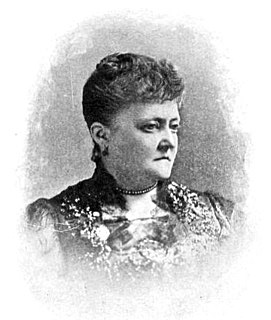
Eugenia Scholay Washington was an American historian, civil servant, and a founder of the lineage societies, Daughters of the American Revolution and Daughters of the Founders and Patriots of America.
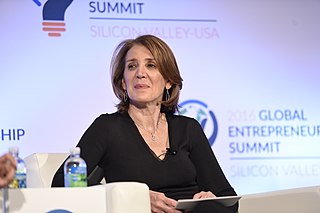
Ruth Porat is a British-American business executive, serving since 2015 as the chief financial officer (CFO) of Alphabet Inc. and its subsidiary Google. Porat was CFO and executive vice president of Morgan Stanley, from January 2010 to May 2015
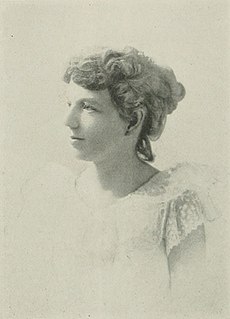
Lollie Belle Wylie was an American poet and composer from Atlanta, Georgia. She was the first paid woman journalist in Georgia and composed the music for the song, which was the official state anthem from 1922 to 1979. She was one of the founders of the Georgia Women's Press Club and the Atlanta Writers Club. In addition to supporting forest preservation, Wylie was the historian for the "Uncle Remus" Memorial Association. In 2013, she was inducted into the Georgia Women of Achievement.

Ruth Karr McKee was for several years a member of the Board of Regents, University of Washington.

Maud E. Craig Sampson Williams was an American suffragist, teacher, civil rights leader, and community activist in El Paso, Texas. In June 1918, she formed the El Paso Negro Woman's Civic and Equal Franchise League and requested membership in the National American Woman Suffrage Association (NAWSA) through the Texas Equal Suffrage Association (TESA), but was denied. Williams organized African-American women to register and vote in the Texas Democratic Party primary in July 1918. She was one of the founders and a charter member of the El Paso chapter of the NAACP, which was the first chapter in the state of Texas. Williams served as the vice president of the El Paso chapter from 1917 to 1924 and remained active in the NAACP until her death. Williams played a significant role in the desegregation of Texas Western College in 1955, which was the first undergraduate university in Texas to be desegregated.